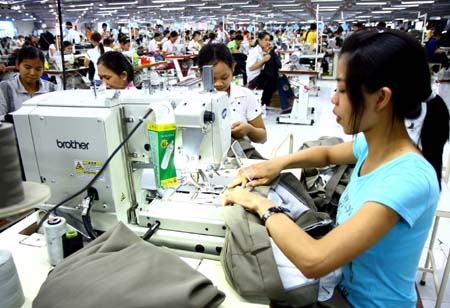
The Government recently issued Decree No85/2015/ND-CP (October 1, 2015) on the implementation of a number of articles of the Labor Code regarding policies on female employees. Items set out in this Decree include support to employers who employ many female employees, improvement of working conditions and implementation of health care for female employees and female employees' entitlements.
 |
The Government recently issued Decree No85/2015/ND-CP (October 1, 2015) on the implementation of a number of articles of the Labor Code regarding policies on female employees. Items set out in this Decree include support to employers who employ many female employees, improvement of working conditions and implementation of health care for female employees and female employees' entitlements.
Support to employers who employ many female employees
An enterprise employers employing many female employees is entitled to Governmental incentives including:
(1) Reduction of corporate income tax; particularly, the Enterprises engaged in production, construction or transportation which employ many female employees are entitled to reduction of corporate income tax equal to the additional amount of expenses incurred for female employees; and
(2) Extra expenses for female employees are deducted from taxable income.
Enterprises are beneficiaries of incentives comprising of:
(1) Employing 10 to 100 female employees, in which female employees account for more than 50% of total employees;
(2) Employing from more than 100 to 1000 employees, in which female employees account for more than 30% of total employees; and
(3) Employing more than 1000 employees.
Policies applicable to the employers
(1) The employer is encouraged, in co-operation with the Trade Union, to implement solutions for female employee's regular employment, applying an employment regime based on a flexible timetable with part-time work and home-based work based on female employees' legitimate aspirations.
(2) Subject to its conditions, the employer aims to help, or support the building of day-care centres or kindergartens, or a part of expenses to the female employee for sending kids to day-care centre or kindergarten in cash or in kind. The employer agrees on level and period of support with the female employee. The employer is encouraged to organise or build day-care centres or kindergartens.
(3) The employer is encouraged to create favourable conditions for female employees fostering children more than 12 months old to milk and to store breast milk at working place.
Entitlements
The Decree guide in detail a number of entitlements enjoyed by the female employees:
(1) Female employee, who is pregnant and has a certificate from a competent medical facility certifying that continued employment would adversely affect her fetus, is entitled to unilaterally terminate or suspend the employment contract. In this case, the female employee must give prior notice, attached together with a recommendation by the competent medical facility to the employer. Prior notice period for termination or suspension of the employment contract is subject to determination by the competent medical facility.
Period of suspension of the employment contract is agreed between the employee and the employer but not less than the period determined by the competent medical facility. In a case of no determination by the competent medical facility, the suspension period is agreed by the employee and the employer.
(2) Female employees fostering children less than 12 months old are entitled to have a 60-minute break per day in working time to feed the child and rest. The off-time is fully paid under the employment contract. The employer sets up a room for milking and storing breast milk subject to actual conditions at working place, the female employee's demand, and the employer's ability.
(3) Female employees are entitled to a gynecologic exam in any periodic health checkup organized by the employer.
The Decree takes effect on November 15, 2015 and replaces the Government Decree No23/CP (April 18, 1996).
(Source: VNS)





